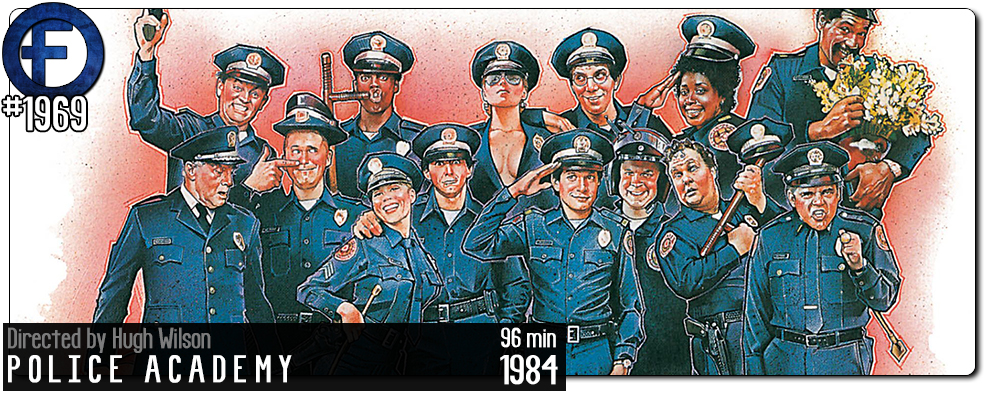Movie Review – Police Academy
Principal Cast : Steve Guttenberg, Kim Cattrall, GW Bailey, Bubba Smith, Donovan Scott, George Gaynes, Andrew Rubin, David Graf, Leslie Easterbrook, Michael Winslow, Debralee Scott, Bruce Mahler, Ted Ross, Schott Thomson, Marion Ramsey, Brant von Hoffman, Doug Lennox, George R Robertson, Don Lake.
Synopsis: A group of good-hearted, but incompetent misfits enter the police academy, but the instructors there are not going to put up with their pranks.
********
Few comedy franchises lasted as long or were as rapidly buried into the ground by creative ineptitude as the Police Academy series. A simple premise involving rag-tag misfits joining the police force boasting juvenile low-brow adult humour and various memorable characters ended up with seven feature films, a couple of short-lived television series, thanks to long-time producer Paul Maslansky, with the original, 1984’s Police Academy, starting things off with generally risible performances and a piecemeal storyline showcasing the various inept characters involved. The film features the star turn of one of the decade’s most amenable performers in Steve Guttenberg, an early Kim Cattrall role as the romantic lead, and the comedic brilliance of George Gaynes, was the breakout appearance of sound-effects vocaliser star Michael Winslow, and produced Robert Folk’s instantly memorable theme tune; despite dated gags and a decidedly un-PC racial prejudice streak, Police Academy’s not-quite-so-vulgar ribald tone holds itself in half-decent stead and remains the franchise’s high-point.
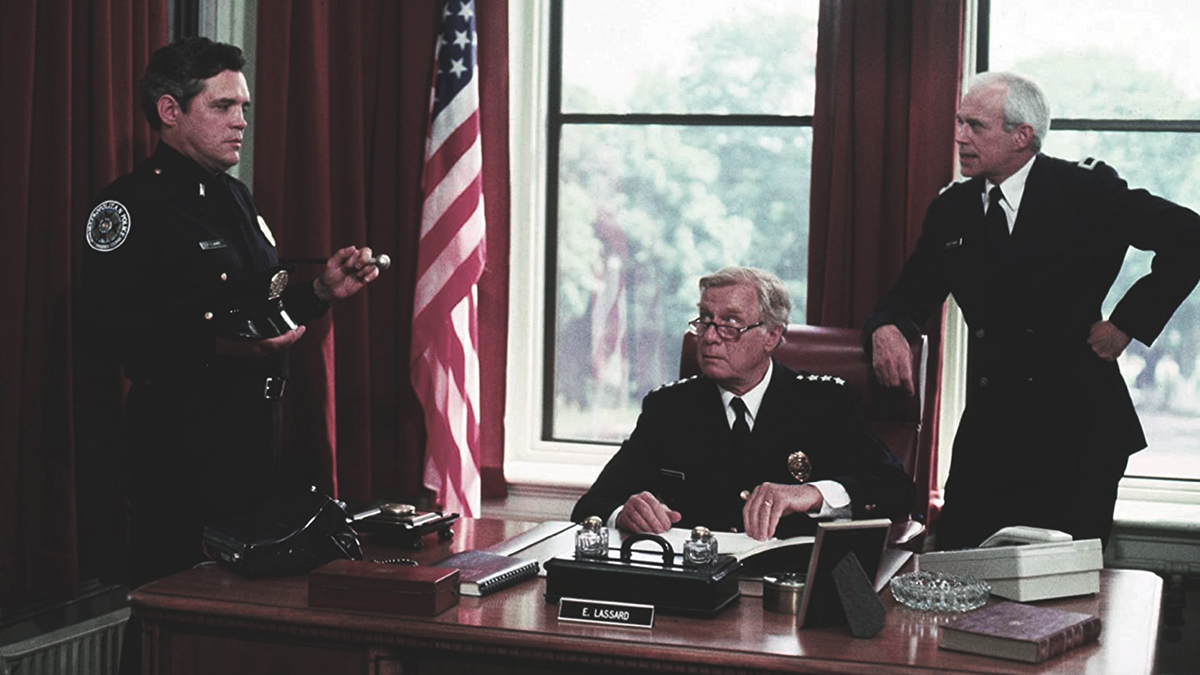
Due to a shortage of police officers, the city mayor decides to throw open recruits to all members of the public, no matter how unsuited to the department’s rigorous standards. Among the new recruits is Cadet Mahoney (Guttenberg – Short Circuit), a long-time antisocial reprobate living the low life, Karen Thompson (Kim Cattrall – Sex & The City) whose sole purpose is to be the romantic interest for Mahoney, the enormous Moses Hightower (former NFL Player Bubba Smith), the militaristic Tackleberry (David Graf), the timid Cadet Hooks (Marian Ramsay), and the human sound machine, Larvell Jones (Michael Winslow – Space Balls). They are put through their Academy paces by the vindictive and cruel Lt Thaddeus Harris (GW Bailey – MASH, Short Circuit), while the benevolent (and completely benign) Academy Commandant, Eric Lassard (George Gaynes – Altered States, Tootsie), undergoing a series of tests including weapons handling, driving, target practice and general exercise, all before a city-wide riot breaks out and they are ordered into action.
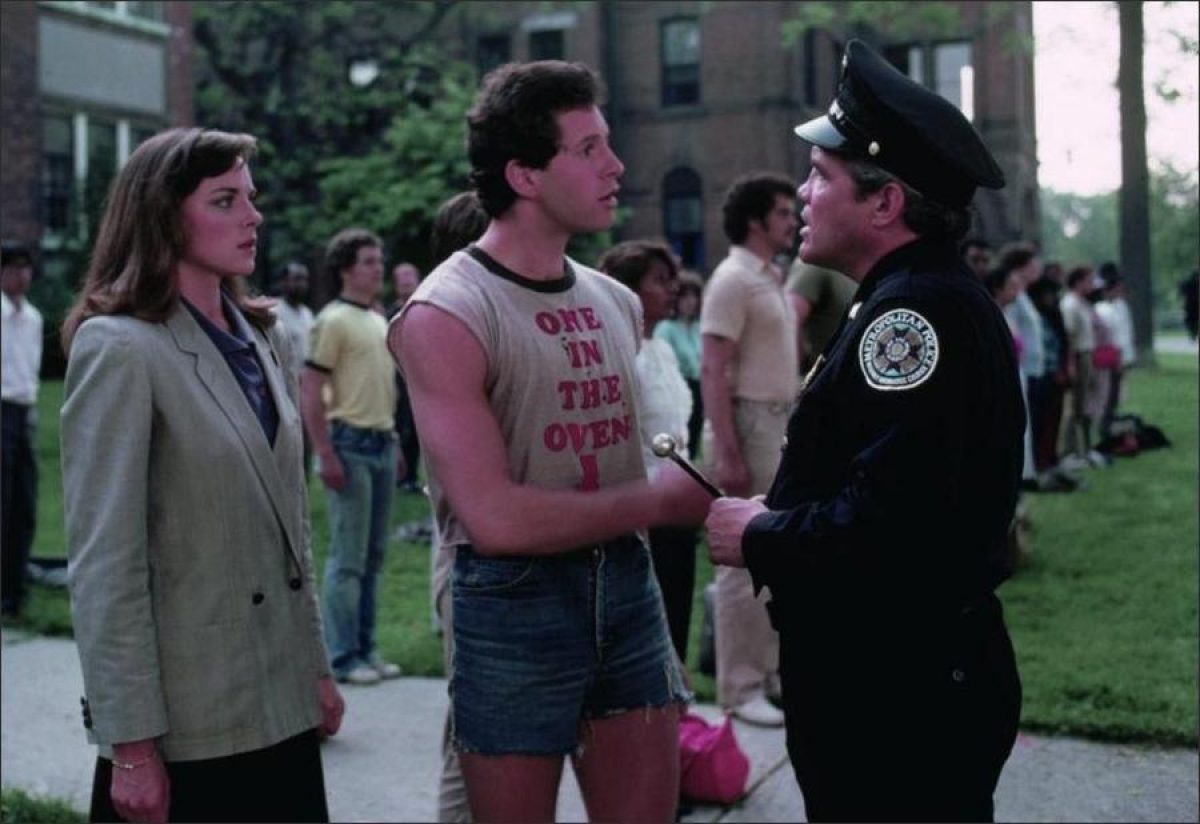
Police Academy is a thinly-written, desperately inane comedy that plays for the broadest possible audience and the lowest common denominator. It’s inane, silly, juvenile trash, mixing dreadful racial stereotypes, dreary sexual innuendo, and works as bottom-of-the-barrel junk cinema; despite the crass nature of its variably qualified screenplay, Police Academy was a runaway success, snagging nearly $150m off a $5m budget (little wonder there were plenty of sequels!), and made cult superstars of various members of the cast. Guttenberg, GW Bailey and George Gaynes were already established, but the likes of Graf, Ramsay and then-rising star Kim Cattrall got a significant publicity boost from the film’s success. Sadly, the film’s scattershot character roster and anti-benevolent approach to equality – sexual and racial – don’t make it an easy watch by today’s standards, and a couple of cringeworthy moments of abject phobic comedy make for distinctly unpleasant watching.
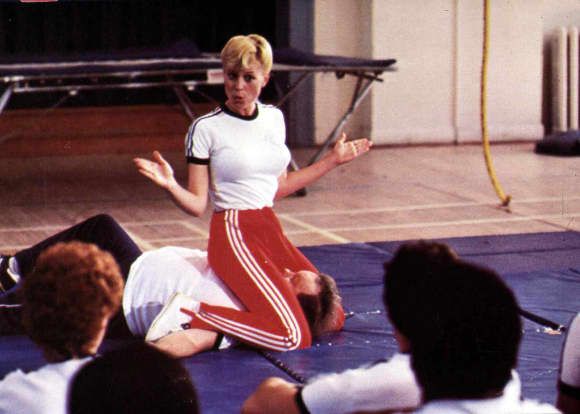
The story and script come from long-time industry stalwarts Neal Israel (Look Who’s Talking, Bachelor Party) and Zucker/Abrams alumni Pat Proft (The Naked Gun, Hot Shots!, Mr Magoo) and you can definitely see the off-the-wall humour derived from both styles of writing inhabiting (nay, inhibiting) Police Academy’s “zany” aesthetic. The film contains a number of notable highlights, almost all of which revolve around the inept, bumbling Lassard, played with deep, gut-busting humour by George Gaynes sliding into full Leslie Nielsen mode as he’s given a surprise podium blowjob whilst delivering the world’s worst powerpoint presentation to a gaggle of his fellow police commanders. Secondary to Gaynes, David Graf is a standout as the violence-prone, ramrod-straight Tackleberry, whose penchant for guns and gunfights is an ongoing thread throughout, and Graf plays the part to the hilt.
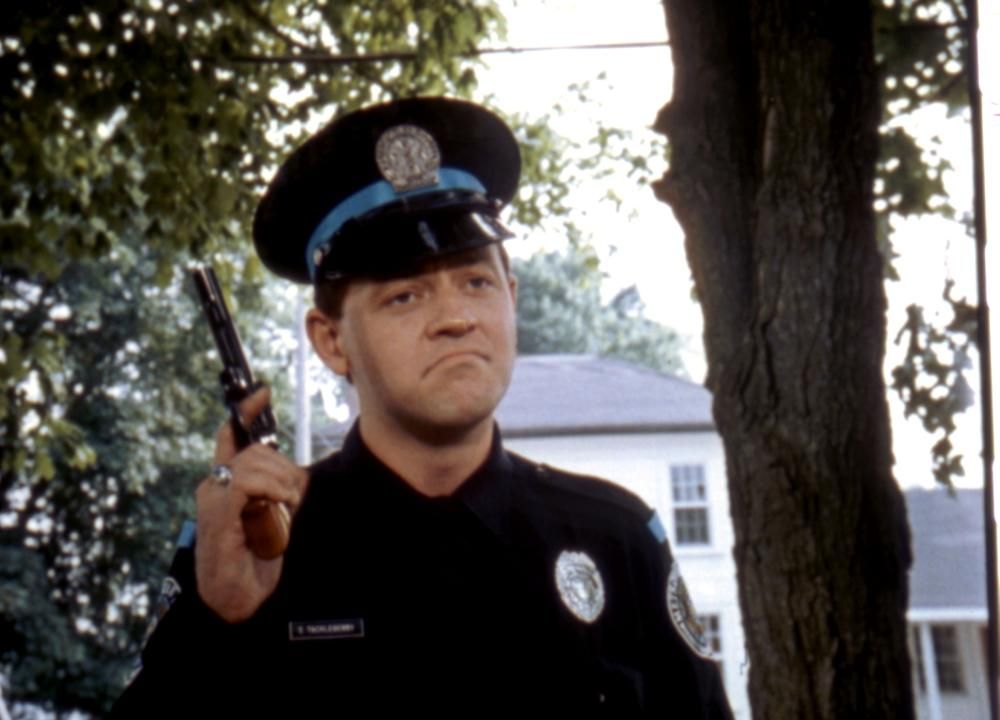
Also working well is the sultry Bridgett Nielsen clone, Leslie Easterbrook as drill instructor Lt Callahan, whose feminine masculinity masks a, how do we put it…. dominant personality beneath the crisp navy blue officer’s uniform. Michael Winslow’s squeaks and bleeps vocal ticks are good for mild chuckles but offers little other than cursory sidebar moments. The quiet Marion Ramsay’s Hooks is a terrible subplot, while Hightower, the ubiquitous “token” giant black man, is given very shirt thrift by a hateful subplot involving his inability to drive. And for all his eye-rolling film clout, Steve Guttenberg’s simple charm as a leading man once more offers the blandest of bland central characters, his nonchalant Mahoney representing the nadir of personality-free 80’s creations and whose only purpose is to become the default leader of this band of miscreants whilst romantically pursuing Kim Cattrall’s Karen.

One of the best and worst things about 80’s comedy films is often the antagonist; Police Academy is no exception, with GW Bailey having to provide the necessary incitement for our bunch to fail or succeed, but also crystallise the rampant arrogance of police officialdom into a single, stridently unfunny cartoon character. Lt Harris isn’t an imbecile, he’s just surrounded by them, a cliched bureaucratic authority figure stuck with mindless minions and dithering superiors, and although I have to hand it to Bailey for doing exactly as the script demanded, I’m inclined to think the direction he was given doesn’t jibe with the rest of the film. Harris is too much of a schmuck to work well enough as a villain (or as close to villainy as Police Academy demands), and Bailey’s constant screeching and caterwauling in the name of laughs wears out its welcome too quickly; the bitter rapport between he and Guttenberg’s Mahoney should have been one of the film’s strengths but the whole thing comes off as awkwardly off-key, Guttenberg playing it too straight against Bailey’s bug-eyed work.
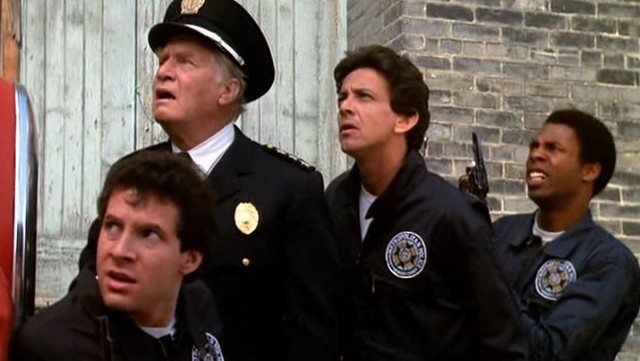
There’s a lackadaisical charm to Police Academy that still works in spite of all the gaping flaws. The film’s budget is stretched beyond breaking point in the climactic “city riot” sequence that closes the film, with a good three dozen extras meant to represent innumerable disaffected citizenry stalking the streets of Toronto, Canada, which was obviously doubling for Los Angeles. Equally anaemic is Hugh Wilson’s direction, which feels flat and curiously inert despite the occasional lapse into frantic; the comedy is situational rather than dialogue-driven for the most part and Wilson’s camerawork hamfistedly captures the raw ensemble frisson at play in this, giving each of the respective bit-players a moment to shine in their various roles. He wisely allows Robert Folk’s pitch-perfect theme and associated musical accompaniment to hold a lot of the film’s duller spots together, and if you’re not humming the title track by the end credits you’re a stronger person than I.
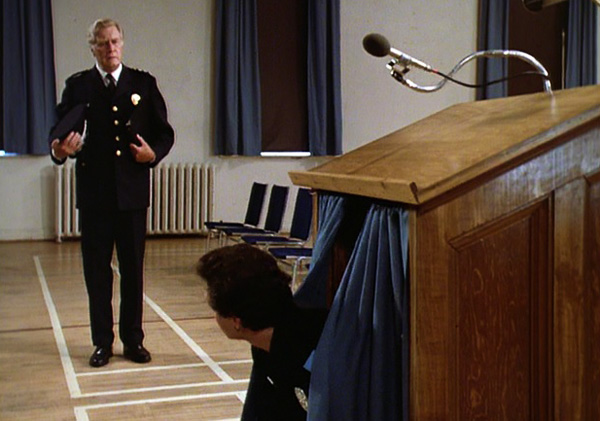
At a relatively brisk 90 minutes the film doesn’t outstay its welcome, has a couple of good chuckles and is memorable for giving us some iconic 80’s film characters. There’s a couple of cringeworthy moments of prejudice and homophobia that doesn’t play well today, but otherwise it’s a fairly stock-standard 80’s comedy flick that entertains enough for what it is, but how the hell they scraped together six more of these continues to baffle me.

